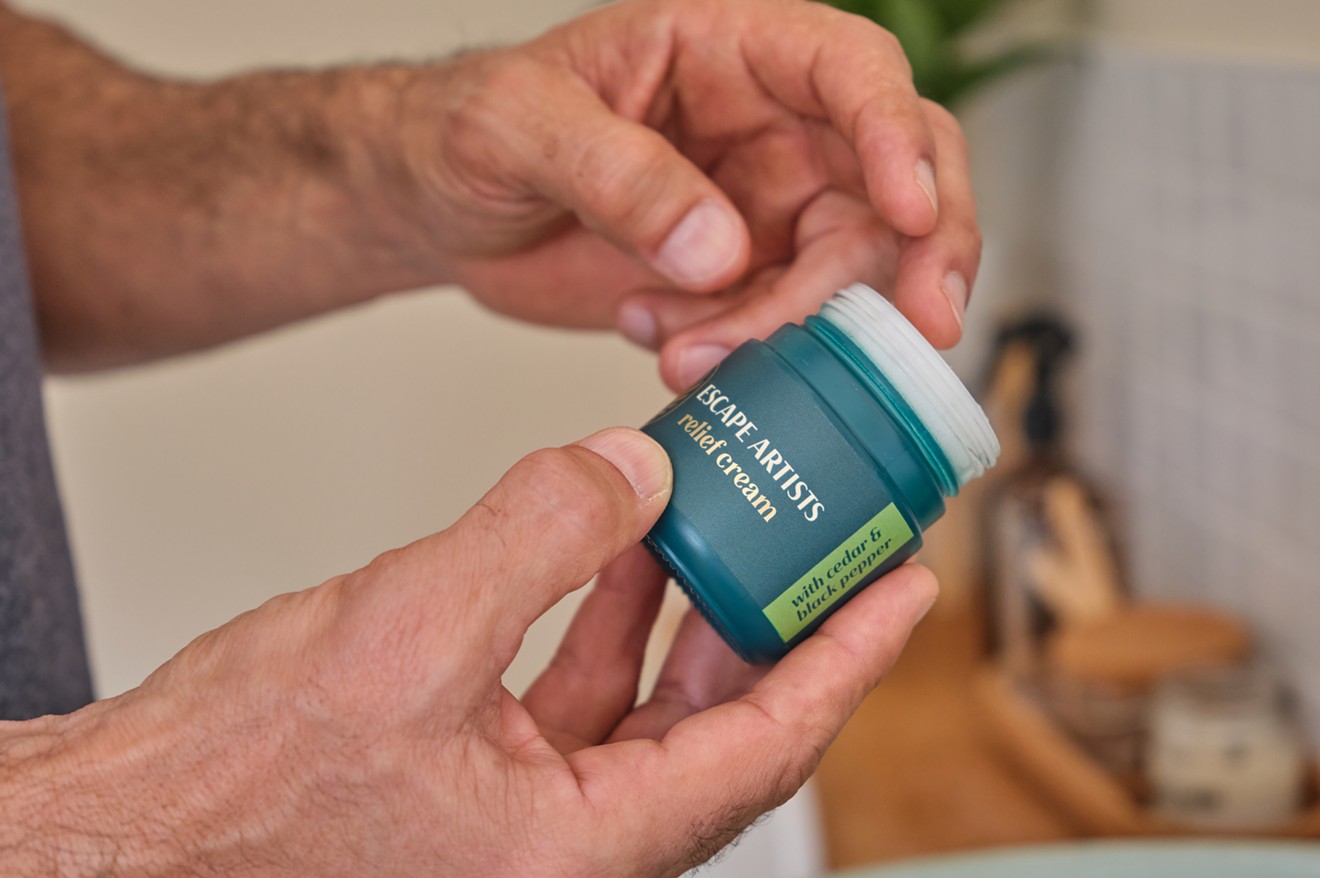Cannabis topicals have been on dispensary shelves for well over a decade, but the average dispensary shopper still knows little about them. Will they get people high? Am I going to fail a drug test for rubbing weed lotion on me? Why even put THC into a lotion, anyway?
We asked Kyle Hammerick, chief science officer at Escape Artists, to calm concerns and answer questions about cannabis topicals, which people use to help aches, chronic pain and even skin conditions. A cannabis brand that makes a wide range of products, Escape Artists creates popular THC and CBD lotions that have earned a well-deserved reputation in Colorado. However, Escape Artists is very present in other parts of the cannabis world, too.
Westword: How many people still think that cannabis topicals will get them high?
Kyle Hammerick: One of the most popular misconceptions about cannabis topicals is that they get people high. Typically, people are reluctant to try cannabis topicals because they fear they will be impacted mentally and thus unable to complete tasks or be otherwise compromised. At Escape Artists, we’ve found it’s important to inform and educate on how they work to help individuals understand that using a topical for relief doesn’t have to come with mind-altering effects.
Are there any other common misconceptions about topicals?
Many of the early topicals on the market were oil-based, leading people to believe that cannabis topicals have to be balms or salves to be effective. I have heard people say that they know it's working because of the oily residue from a salve. This just isn’t the case. In fact, the hydrating qualities of lotions can actually help compounds permeate the skin, possibly making water-based creams or lotions even more effective than greasy balms or salves.
On top of relief and recovery, do THC and CBD topicals help with skin issues?
Many of us experience dry skin here in Colorado, and topicals contain various emollients and humectants that can help moisturize skin. With respect to THC and CBD, there is quite a bit of research establishing cannabinoids as anti-inflammatory and immunomodulatory compounds. So if the skin condition is inflammatory in nature, cannabis compounds may be able to provide some relief, but there would need to be well-controlled clinical studies conducted prior to recommending cannabis for specific conditions.
You also make hemp-derived CBD creams. What does adding THC to the mix provide, and what does the CBD do by itself?
The current body of research indicates that both THC and CBD have anti-inflammatory properties; adding more putative anti-inflammatories to the topicals expands the receptor space that can be engaged by the topical and possibly enhances its efficacy.
I see that Escape Artists' foundation is from the food and pharma industries. How much science is there to lean on in regard to the topical application of cannabinoids?
There is a broad range of science specific to delivering therapeutics to and through the skin, regardless of the specific compound. For instance, topical nonsteroidal anti-inflammatories have proven effective and better tolerated than oral dosing for osteoarthritis. So we can leverage quite a bit of existing knowledge general to drug delivery. However, there is much to be learned in this specific space, and our efforts to quantify the delivery efficacy of various cannabis compounds, as well as their effects, continue.
How do you view the topical potential of cannabinoids outside of CBD and THC, like CBG and CBC?
Cannabinoids interact with receptors in the body in different ways, turning them “on” or “off” to various degrees. The understanding of the mechanisms of action of major cannabinoids like CBD and THC is still in its infancy. And while CBG and CBC are now becoming widely available, their potential uses are even more nascent.
CBG appears to be another strong cyclooxygenase inhibitor. Cyclooxygenase is a key enzyme induced by inflammatory stimuli and is a target of nonsteroidal anti-inflammatory drugs (NSAIDS) like ibuprofen. CBG may also increase the production of sebum, the skin’s natural oily moisturizer, thus helping dry skin. CBC, on the other hand, may actually suppress sebaceous lipid synthesis, making it a candidate for reducing oily skin that can lead to acne. So there is quite a bit of complexity in the signaling pathways of cannabinoids, and much work to do to develop effective therapies and products from them.
As a brand with an established reputation in topicals, why go into edibles and pre-rolls?
We do have quite a bit of brand awareness around our topicals, but we actually started in the cannabis space by creating novel delivery modes for cannabis compounds in general. In fact, our first product was in the edible space, aimed at delivering THC and CBD through the oral mucosa (cheeks and gums) as a substitute for smoking. So while we have gained a reputation in the topical space, we have worked to bring quality products to all facets of cannabis consumption. As far as future products go, the potential for cannabis to augment good sleep practices hasn’t gone unnoticed, and we will soon launch products in this space with the same attention to purposeful and technically sound formulations that have made our topicals so well regarded and effective.
[
{
"name": "Air - MediumRectangle - Inline Content - Mobile Display Size",
"component": "12017618",
"insertPoint": "2",
"requiredCountToDisplay": "2"
},{
"name": "Editor Picks",
"component": "17242653",
"insertPoint": "4",
"requiredCountToDisplay": "1"
},{
"name": "Inline Links",
"component": "18838239",
"insertPoint": "8th",
"startingPoint": 8,
"requiredCountToDisplay": "7",
"maxInsertions": 25
},{
"name": "Air - MediumRectangle - Combo - Inline Content",
"component": "17261320",
"insertPoint": "8th",
"startingPoint": 8,
"requiredCountToDisplay": "7",
"maxInsertions": 25
},{
"name": "Inline Links",
"component": "18838239",
"insertPoint": "8th",
"startingPoint": 12,
"requiredCountToDisplay": "11",
"maxInsertions": 25
},{
"name": "Air - Leaderboard Tower - Combo - Inline Content",
"component": "17261321",
"insertPoint": "8th",
"startingPoint": 12,
"requiredCountToDisplay": "11",
"maxInsertions": 25
}
]













